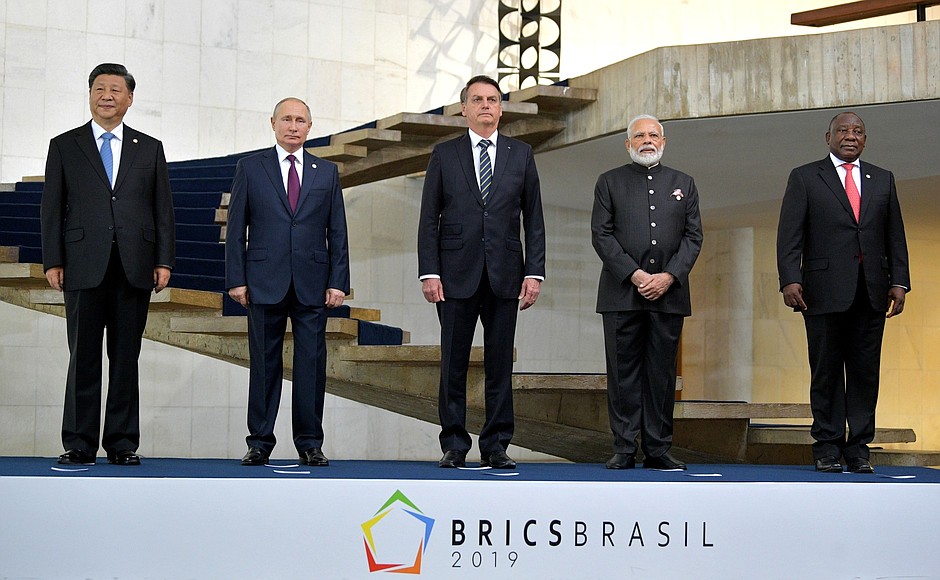On November 13th and 14th, the 11th BRICS Summit took place, with leaders from Brazil, Russia, India, China and South Africa, as well as other officials in attendance.
The two days of the event can be viewed in two complete videos:
The summit took place in Brasilia, Brazil and concluded with the signing of the Declaration of the 11th BRICS Summit, which can be read in its entirety on the Kremlin’s website.
The leaders of the BRICS countries met at an official consultation, to outline what has been done so far and what needs to be done in the future.
Russian President Vladimir Putin outlined the priorities of Russia’s 2020 BRICS presidency and invited the leaders to the 12th BRICS Summit in St. Petersburg. The above-mentioned declaration was adopted following the meeting.
“Over the past 10 years, BRICS has achieved serious results and has gained a reputation as a respected association. At the same time, the coordination mechanisms established within BRICS make it possible to cooperate effectively in politics, security, trade, finance and culture,” Putin said.
Putin further spoke of adhering to international agreements and building a stronger position for developing countries so that a “just global order” may be established.
“It is important that the BRICS countries closely cooperate in addressing global and regional problems. Together we speak in favour of strict compliance with the norms of international law and the central role of the United Nations in international affairs. Our countries promote the influence of developing countries in the global management system, as well the establishment of a more just global order.”
One of the most significant outcomes of the summit was the underlined commitment to further economic and financial cooperation.
As, Kirill Dmitriev, the head of the Russian Direct Investment Fund (RDIF), said “increasing non-market risks of the global payment infrastructure” was behind the plan to integrate the group’s national payment systems.
“An efficient BRICS payment system can encourage payments in national currencies and ensure sustainable payments and investments among our countries, which make up over 20% of the global inflow of foreign direct investment,” Dmitriev, who is also a member of the BRICS Business Council said.
He said Russia had made a considerable effort over the last several years to reduce dollars in foreign trade. In the last several years, Russian foreign trade payments in dollars have dropped to 50% from 92%, while rouble transactions have jumped from14% to 3%, he added.
The declaration of the summit praised the success of the New Development Bank and the role it would play in the future.
“We note with appreciation the role of the New Development Bank (NDB) in infrastructure and sustainable development financing. We stress the need for enhanced efforts to build a strong, balanced and high-quality portfolio of projects. We also note with pride the 5th anniversary of the signing of the NDB’s Articles of Agreement in Fortaleza, Brazil and welcome the upcoming mid-term review of NDB’s General Strategy.”
Admittedly, the NDB needs more members and that is the aim of the future period.
Furthermore, the BRICS Local Currency Bond Fund is to be established soon, but little information was provided, this refers to the statement by Kiril Dmitriev, above.
“We note the progress achieved in establishing a BRICS Local Currency Bond Fund and look forward to its operation. We support the on-going collaboration to develop our local bond markets. We will continue to communicate on other possible areas of currency cooperation, consistent with each central bank’s mandate.”
Furthermore, in all discussions, and summarized in Vladimir Putin’s closing speech at the BRICS Business Forum, the member countries expressed their willingness to counter protectionism and unfair trade practices.
“The more frequent use of unfair competition methods in global trade, as well as unilateral sanctions, including politically motivated sanctions and rampant protectionism, have undoubtedly impacted the economy. In these conditions, BRICS countries have to exert serious efforts in order to ensure the development of their own economies, and to prevent an aggravation of the social situation and a decline in living standards and the well-being of our countries’ citizens.”
Putin further announced that Russia would propose a new Economic Partnership Strategy, an update of the old, 2015 one.
“First of all, we are planning to propose that BRICS countries update the Economic Partnership Strategy, which was adopted at the 2015 summit in Russia. It would be appropriate to think what new goals our association should set, and what truly large-scale joint tasks in trade, finance and investment we should focus on. Of course, we will use all the constructive ideas and proposals that have been submitted by the BRICS Business Council, the New Development Bank, and the business and expert communities.”
It is becoming more apparent that the influence of the BRICS countries is increasing in recent years (despite Brazil clearly being a sort of US proxy state, but that also can’t last indefinitely). Military opposition aside, economically and financially the countries can clearly and quite obviously counter much of the antagonistic and unilateral actions that Washington undertakes. It is visible in Iran, and in terms of foreign policy it is most recently and obviously visible in the events in Venezuela.
MORE ON THE TOPIC:






